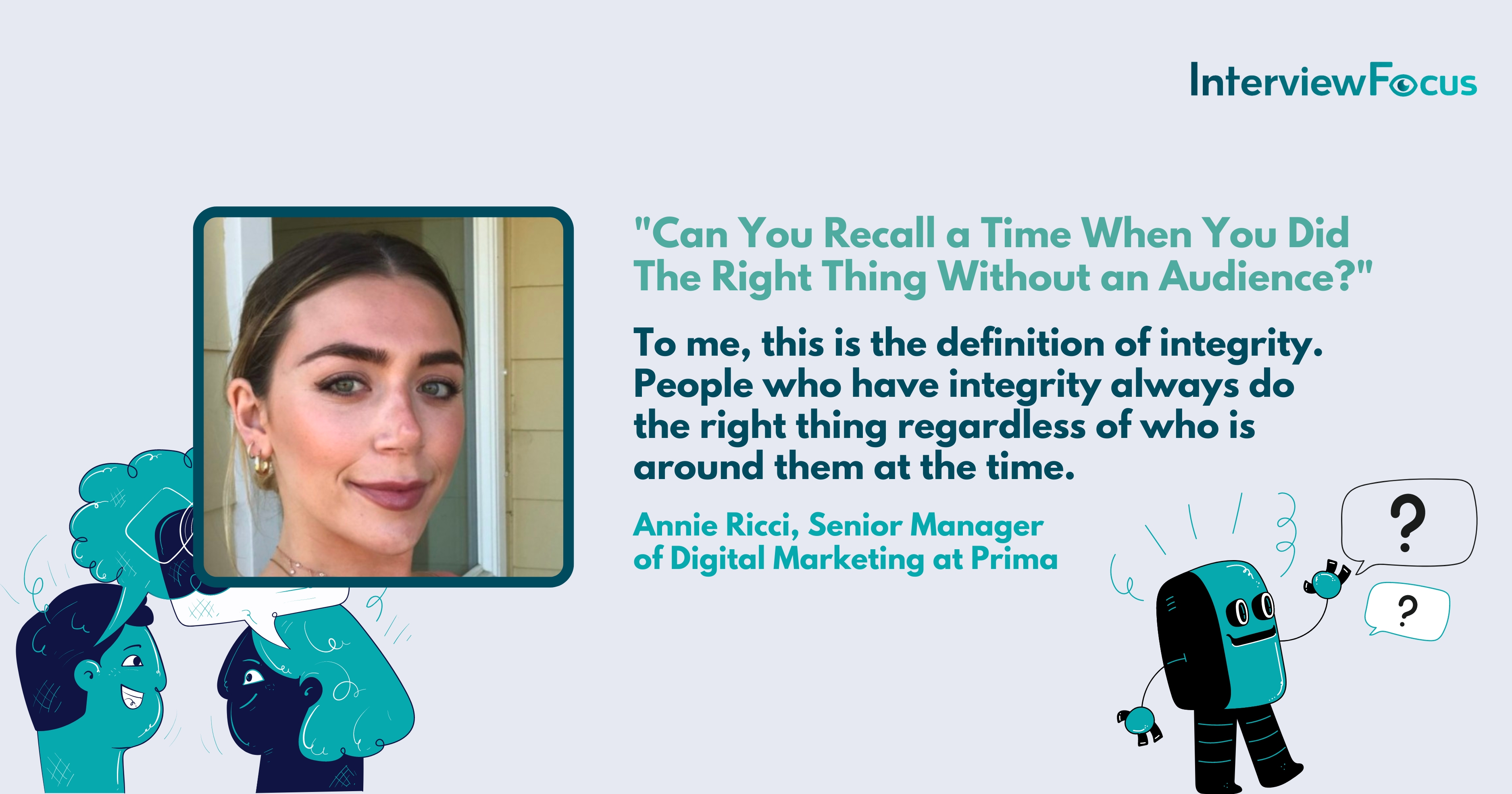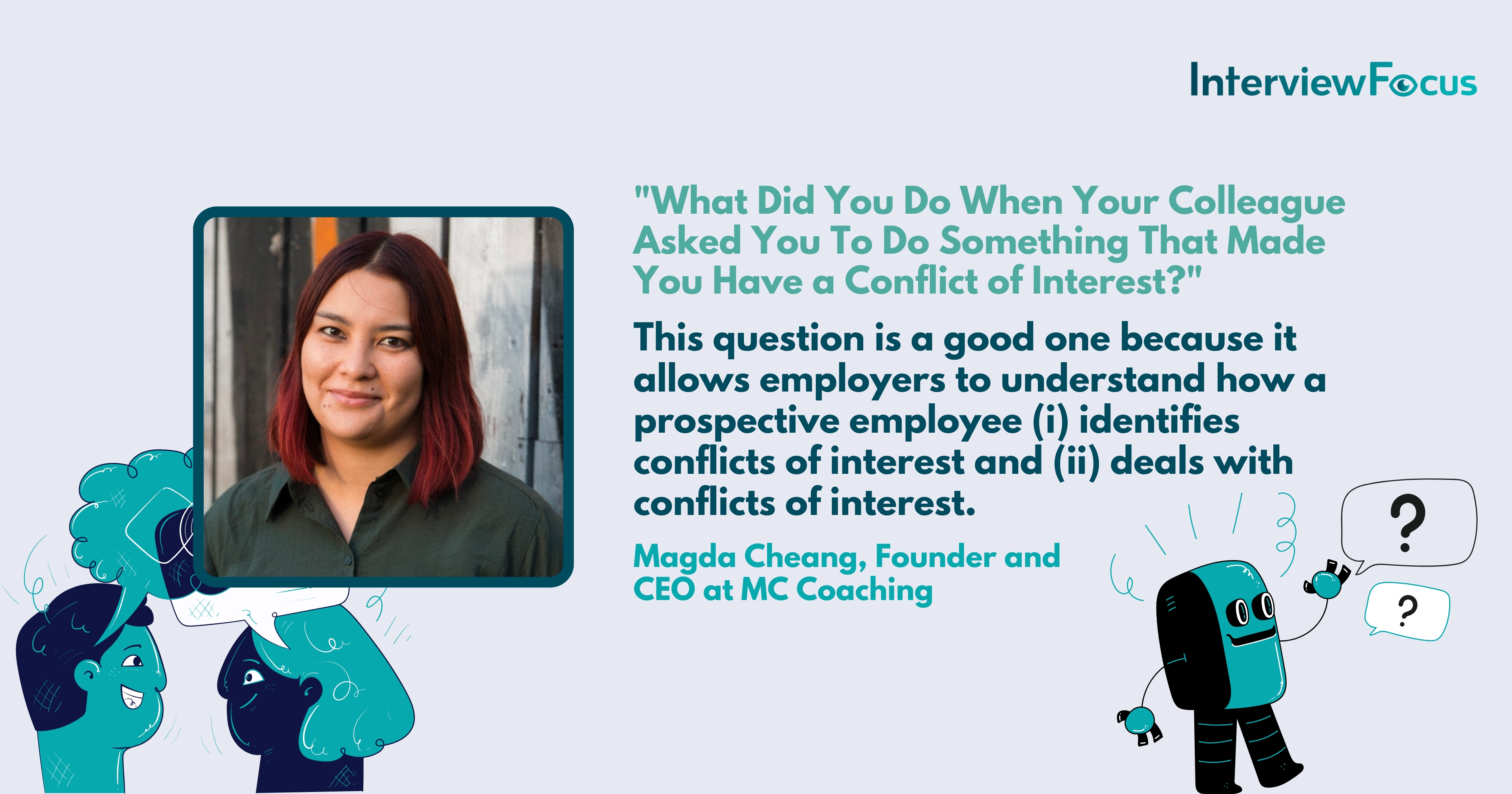What is a Good Interview Question About Integrity?
From “Have you ever experienced consequences for doing the right thing?” to “Tell me about a time when you saw or heard something that made you uncomfortable. How was the situation dealt with?”, here are 10 answers to the question, “What is a good interview question about integrity to ask a prospective employee?”
- Have You Experienced Consequences After Doing the Right Thing?
- Can You Recall a Time When You Did The Right Thing Without an Audience?
- What Steps Would You Take After Witnessing Your Work Best Friend Do Something Questionable?
- Tell Me About a Time You Made a Mistake?
- What Did You Do When Your Colleague Asked You To Do Something That Made You Have a Conflict of Interest?
- What Would You Do If You Recognized an Organizational Values Mismatch?
- When Did You Go Against Your Values to Achieve a Goal
- How Do You Typically Respond to Gossiping in Your Team?
- What Would You do if Your Boss Asked You to do Something That was Against Company Policy?
- How Did You Deal When You Witnessed Something That Made You Uncomfortable?
Have You Experienced Consequences After Doing the Right Thing?
Plenty of people understand the meaning of integrity, but don’t prioritize it as a trait to have. Try asking, “Have you ever experienced consequences for doing the right thing?” followed by, “Was it worth it?” Be sure to leave plenty of space for your candidate to elaborate.
This two-part question is a good way to understand a candidate’s views on the worth of integrity, rather than just its meaning. It allows them the chance to express their personal opinions without being overly guided toward the answer they think you want to hear.
While it won’t be completely comprehensive, open-ended questions such as these allow the best opportunity to glimpse your candidate behind their trained mask of interview professionalism. That’s where you’ll have the best chance to learn a bit about their real feelings regarding practicing integrity.
Max Schwartzapfel, CMO, Schwartzapfel Lawyers
Can You Recall a Time When You Did The Right Thing Without an Audience?
Can you recall a time when you did the right thing, even though no one was watching? To me, this is the definition of integrity. People who have integrity always do the right thing regardless of who is around them at the time. I think at times we’ve all been tempted to cut a corner when we knew we could get away with it. However, deciding to do the honorable thing in those moments is what separates those who have integrity from those who don’t.
Annie Ricci, Senior Manager of Digital Marketing, Prima

What Steps Would You Take After Witnessing Your Work Best Friend Do Something Questionable?
Often times we find close friends in the workplace. If you witnessed your best friend in the workplace doing something that may make someone question the person’s integrity, would you address it with your friend? How would you address it?
Asking prospective employees about how they would handle a situation involving a close friend and potential ethical breaches can be an effective way to gauge the candidate’s understanding of integrity. The question doesn’t directly address the candidate’s perceived integrity of themselves but instead lets you find out if they have the integrity to address a questionable situation.
Jeremy Reis, Founder, Explore Startups
Tell Me About a Time You Made a Mistake?
How do you ask someone during a job interview if they have integrity traits such as honesty, taking responsibility for their actions, and consistently doing “the right thing”?
A great interview question to assess these qualities is, “Tell me about a time you made a mistake or failed.” If the candidate avoids sharing a personal failure experience and instead talks about fixing someone else’s mistake or failure, it could be a red flag.
Everyone makes mistakes and experiences failure; it is a natural part of growth and success. An employee who can’t admit to their own errors is an employee who is likely to blame others instead of accepting responsibility. Those who won’t admit to their mistakes will also miss out on the chance to learn from those mistakes.
Look for a candidate who is willing to be honest and share a story about a personal mistake or failure-including how they took full accountability and used the experience as an opportunity for growth.
Lili Foggle, Founder and Interview Specialist, Impressive Interviewing
What Did You Do When Your Colleague Asked You To Do Something That Made You Have a Conflict of Interest?
Please tell me about a time a colleague asked you to do something that made you have a conflict of interest. What did you do? This question is a good one because it allows employers to understand how a prospective employee (i) identifies conflicts of interest and (ii) deals with conflicts of interest. It also helps employers understand your ability to handle conflict and also manage relationships at work.
Magda Cheang, Founder and CEO, MC Coaching

What Would You Do If You Recognized an Organizational Values Mismatch?
After a few months in an organization, you realize that the values aren’t aligned with what is mentioned publicly. What would you do?
With more Gen Z and millennials joining the workforce, it has now become a priority for organizations to walk their value talk. Studies suggest that most young employees are keen on finding a right value fit alongside learning, flexibility, and paycheck.
By asking this question, you will have a clear idea if the candidate is high on integrity and will know how they would respond to such situations, thus helping you gauge if they are a good fit.
As a Gen Z career coach and social impact consultant, I’ve been in organizations where values preached were not remotely practiced. In such a situation, I first chose to analyze situations in my circle of control.
Secondly, I raised the concern to the respective departments. When concerns were paid a deaf ear, I had no option but to quit. In social development, value alignment is just as important as your paycheck.
Tanisha Guin, Deputy Manager, Social Impact Consultant, Career Coach, ICICI Foundation for Inclusive Growth
When Did You Go Against Your Values to Achieve a Goal
This is a slightly tricky question because how you answer this will give the prospective employer an insight into your value system and, more importantly, how honest you are. Will you do whatever it takes to achieve a certain goal, or will you stand by your value system? And, more importantly, what is your value system? In your answer, be sure to highlight the value that you were asked to go against and how you tackled the situation without going against your values.
Narmie Thambipillay, CEO, Narmiet
How Do You Typically Respond to Gossiping in Your Team?
When responding here, you can make a couple of general points on the importance of confidentiality and trust within a team. Gossiping is a tactic to build alliances and connections in teams, but ultimately it is unhelpful and toxic behavior.
Here are some suggested responses to gossiping:
- Lead by example-do not engage in gossiping behavior.
- Be more aware of gossiping behavior (it can be very subtle), and if it enters a conversation, simply respond, “That’s not my story to tell or hear.” You could then change the subject.
- If gossiping continues, remove yourself from the conversation. You can do this by saying, “I’ve just remembered I have to make a call” or “I’m going to top up my coffee, would anyone like something?” etc.
- As a manager, you could also organize a briefing session on psychological trust, the bystander effect, and team dynamics to develop your team’s awareness of how gossip undermines the values of the organization.
Elaine Fitzgerald McBarron, Learning and Development Specialist, Career Compass
What Would You do if Your Boss Asked You to do Something That was Against Company Policy?
A hypothetical question can reveal much more about a job candidate’s true nature than asking for a specific example from their past. Those situational questions are expected, so “good answers” are typically scripted and rehearsed before the interview.
Asking, “What would you do if.?” can prompt a more genuine, spontaneous answer. For example, asking, “What would you do if your boss asked you to do something that was against company policy?” is a good question to determine a person’s sense of integrity.
Trish McGrath, CCTC, CDCS, Executive Career Coach, Edge Career Solutions
How Did You Deal When You Witnessed Something That Made You Uncomfortable?
Tell me about a time when you saw or heard something that made you uncomfortable. How was the situation dealt with?
Without divulging too much in the response (highlighting that you practice confidentiality) make sure to present the situation and how you addressed the person(s). Talk about the actionable steps taken and how things went moving forward. You always want to resolve an interview question.
Never leave the question hanging. Show that there were steps taken to maintain the company culture, your integrity, and respect for yourself and your workplace. Highlight your professionalism.
Zeeta Maharaj, Interview Coach, Profilia






